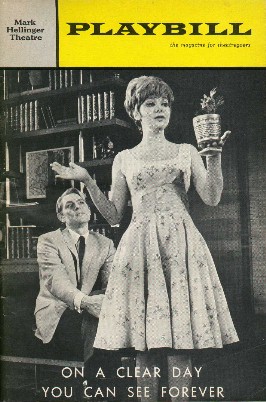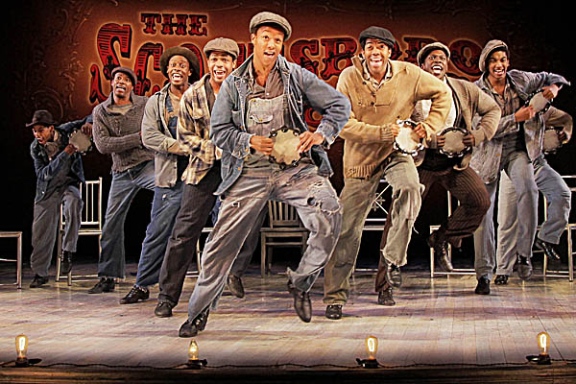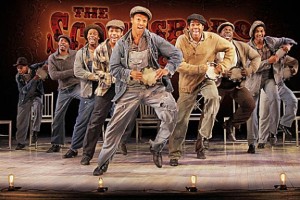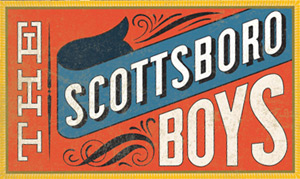
“Some people get antagonized by the truth.”
That is one of the many truth-bombs dropped at a fateful, disastrous dinner at the Weston house by matriarch Violet. You see, Violet is angry. She has cancer of the mouth, a volatile marriage, residual issues that stem from her problems with her mother, and a penchant for painkillers – any and all. Well the truth is, the play is still one of the most galvanizing theatrical experiences on Broadway, whose volatility remains unmatched by anything that has opened since.
August: Osage County, last year’s enormous Pulitzer and Tony-winning success is still playing at the Music Box Theatre and a new mama has joined the company. To put it mildly, she will cut you. Tony-winner Phylicia Rashad seemed an unlikely choice to fill shoes occupied by Tony-winner Deanna Dunagan and her stellar replacement Estelle Parsons. There were people who felt that there were too many racial undertones in the character for an actress of color to play the part. However, to those naysayers, I offer a polite “phooey.” (Spoiler alert pending in the next paragraph).
From the moment Rashad stumbles down the stairs in a drug-addled stupor and viciously turns on John Cullum, any and all preconceived ideas about her casting are erased from memory. (*Spoiler alert* For the first time, I thought “So this is why he killed himself” *End Spoiler*). This play does offer the character the opportunity to voice some politically incorrect comments about “Indians,” but color is innocuous here. Phylicia Rashad is once again playing an earth mother, but an earth mother who has experienced torment and disappointment in her life and is unafraid to express it or take out her rage on her family. Fact of the matter: the actress is nothing short of revelatory.
Rashad marks the fourth Violet I’ve seen. I took in Dunagan twice, her opening night and final performance; Parsons I saw twice and on one occasion earlier this year saw the capable understudy Susanne Marley, whose performance is molded on Dunagan’s. Each actress has brought something different to the part. Dunagan was selfish, clingy and ultimately childish under a bitingly caustic veneer. Parsons was stronger with a passive aggressive approach to her attacks, with a final breakdown of considerable pathos.
Now revitalizing the production at the Music Box (the understudy performance was strong, but not the special event the show is intended to be), is Rashad, also the first actor in the production to receive above the title billing. The last time I saw her onstage was in the 2008 revival of Cat on a Hot Tin Roof. While enjoyable, her performance was more caricature than character and in that I found my worries regarding August.
Let it be said, there is nothing to fear here. Rashad’s Violet is angry, but she is also no nonsense, with eyes of frigid sobriety defying her lucid state of mind. Rashad brings great emotional wealth to the character in the first act, where I heard and understood lines for the first time. There are times when you might even feel sorry for her. Then you get to the climactic second act, where she proceeds to eviscerate everyone in sight. It is here that Violet’s rage comes to a boiling point. She may be loaded on her painkillers, but her character knows exactly what she’s doing. She is simultaneously taking out her aggression on those people readily available while masochistically setting herself up for a violent confrontation.
I was seated on the left center aisle for this entire scene and had a beautifully uncompromising view of Rashad’s face for the duration of the twenty minute scene. The actress spoke volumes with her steely eyes, and in her anger she was unpredictable and at times downright frightening. A sideways glance from her Violet is enough to wither anyone into cowering silence, with one notable exception. (More on her later). Hers is a performance to be reckoned with, and has brought a new invigorating dynamic to the cast, keeping the entire ensemble on their toes. You couldn’t ask for better theatre.
Elizabeth Ashley has put away her walker from Dividing the Estate and donned a gaudy wig to play Violet’s sister, Mattie Fae. Larger than life, Ashley’s Mattie Fae is closer in form to originator Rondi Reed’s characterization and is a vast improvement on previous replacement Molly Regan. She brings gauche earthiness and Southern sensibility to the part and as a result, Mattie is once again a colorful, crowd pleasing favorite. Though her performance is brushed with broader strokes than her predecessors, she still garners the audience’s sympathy in her grounded last scene.
John Cullum offers the best portrayal of Beverly Weston since the late Dennis Letts, with a folk-like whimsy undercut by resigned melancholy. Anne Berkowitz is Jean and is the most true to life teen I’ve seen in the role. Brian Kerwin is the only original cast member to stay with the production all the way through, playing Steve with the same combination of cockiness and sleaze.
Lots of original cast members have returned. Kimberley Guerrero is still playing Johnna, the Native American hired by Beverly to look after Violet and is a quiet source of comfort and solace for the family. Mariann Mayberry and Sally Murphy also returned as Violet’s two other daughters. Mayberry is still hilarious and devastating as the insecure youngest Karen, though she’s given up her bit with the olives. When she defiantly tells Barbara she’s going to Belize, it is nothing short of heartbreaking.
Murphy; however, needs to be reigned in. Her performance as Ivy has gone so wildly over the top that she switches between two levels: calm deadpan and incoherent high-pitched screeching. Whenever her emotions are vaulted, her voice jumps an octave and lines are lost. It’s glaringly inappropriate especially when juxtaposed with the more nuanced work of her scene partners.
Also returning to the cast is Amy Morton, whose titanic performance as eldest daughter Barbara, clearly her mother’s daughter is once again the emotional anchor of the piece. Finding herself in a failing marriage, handling her rebellious teen daughter while unsuccessfully trying to hold her family together, Morton is still giving the production’s most profound characterization. From her entrance to her exit, Morton is a fully-dimensional force of nature, ready to attack both her unfaithful husband and mother, but also herself. When Morton goes head to head with Rashad, it is as close to onstage fireworks as one is likely to find. (The only other onstage confrontation that comes close are the leading ladies of Mary Stuart). Her second act curtain line is still a shocking, earth shattering war cry that must be experienced live to be fully appreciated.
Morton’s is the sort of performance that comes along so rarely. So palpably honest, the line between acting and reality become forever blurred. Actors of the Golden Age rave about their memories of Laurette Taylor in The Glass Menagerie; I offer Amy Morton in August: Osage County.
Rashad is contracted through August 23. Unfortunately, it looks as if she can’t extend due to her commitment to the London engagement of Cat on a Hot Tin Roof this fall. First timers will be floored by the experience as the staging is still taut and high octane; repeat viewers (this was my sixth time seeing the play, remember) will be more than pleased at the shape the play is in. The cast still functions as an organic ensemble, with the relationships between the veterans and newcomer Rashad so functionally dysfunctional, you’d think she originated the part.
The play is still one of the most hilarious and one of the most gutwrenching dramatic experiences onstage in NY. Chances are I will most likely return a seventh time. Rashad and Morton are worth it.






